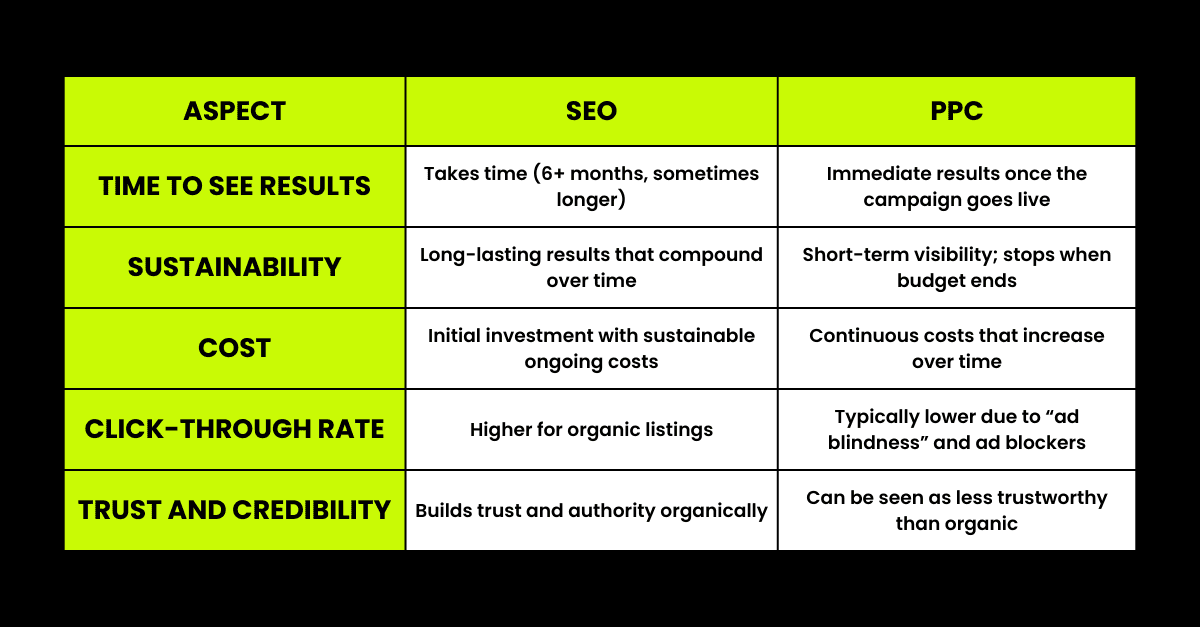The debate over digital growth strategies continues to thrive, and fierce budget competition is stronger than ever. Among the most discussed are SEO (Search Engine Optimisation) and PPC (Pay-Per-Click) advertising. While both approaches can bring measurable results, an effective SEO strategy is vital for long-term business growth.
The Core of SEO Strategy: Building a Sustainable Foundation
An SEO strategy revolves around improving the visibility of your business website on search engines like Google, ensuring that potential customers find you organically. While paid advertising, such as PPC, delivers immediate visibility, SEO is a long-term investment that compounds over time.
Imagine SEO as a marathon, where consistent effort helps build authority, trust, and relevance in the eyes of search engines and users. PPC, by contrast, can be likened to a sprint—a quick way to get in front of your target audience but with finite results the moment you stop paying for ads. Let’s explore why SEO outpaces PPC in terms of long-term business growth.
SEO Strategy Delivers Compounding Results
One of the most compelling aspects of SEO is its ability to deliver compounding returns. By focusing on optimising your website’s structure, content, and overall user experience, you lay a foundation for continuous organic traffic growth.
For instance, let’s say you publish a well-researched, keyword-optimised article today. It may wait to see significant traffic, but as search engines crawl and index your content over the coming months, it could rise in rankings. As you add more relevant content, gain backlinks, and continue optimising, this content will build authority, ultimately driving more traffic long after the initial effort.
On the other hand, with PPC, the moment you turn off your ad budget, your visibility disappears. There’s no residual effect; once the spending stops, so do the results.
Consider a business that invests £5,000 per month in PPC and another £5,000 in SEO. While the PPC campaign may deliver quick traffic, the SEO investment creates lasting growth. By month 12, the PPC campaign will need another £5,000, if not more, per month for increased results, but the SEO campaign will drive sustainable organic traffic without additional costs.

SEO Strategy Aligns with Customer Behavior
Modern consumers increasingly rely on search engines to research and make purchasing decisions. Whether looking up product reviews, checking for nearby services, or comparing prices, users are accustomed to finding relevant, trustworthy results organically. A well-executed SEO strategy helps businesses capture this intent-driven traffic by ranking for keywords that matter to their audience.
In contrast, PPC campaigns often target transactional or interruption-based intent. Users are likelier to click on organic results because they trust them more than paid ads. Studies have shown that users are more likely to skip over ads in favour of organic results, making SEO even more critical.
According to Smart Insights, 53% of all trackable website visits come from organic search, compared to 27% from paid search. Despite the more prominent placement of ads, organic results continue to dominate in terms of user trust and clicks.
Another 2024 study by First Page Sage found that the #1 organic search result receives 39.8% of clicks, while the top paid ad garners just 2.1%. This highlights users’ preference for organic results as they are perceived to be more trustworthy and relevant.
Cost Efficiency: SEO vs. PPC
While SEO requires upfront investment in resources, tools, and expertise, it generally becomes more cost-effective over time. As mentioned earlier, the results compound. With a steady stream of organic traffic, the need for continuous financial input diminishes, unlike PPC, where costs remain constant or increase as competition for ad space grows.
PPC campaigns can become expensive in industries with high CPC (cost-per-click) rates. For example, insurance and legal services often see CPCs in the £50-£100+ range, meaning businesses must pay a significant premium to acquire a click. In contrast, SEO efforts can be targeted and sustained at a fraction of the cost, delivering valuable traffic without paying for each visit.
Building Trust and Credibility
SEO focuses on delivering quality content that satisfies users’ search intent. By doing so, businesses rank higher on search engine results pages (SERPs) and build authority and trust with their audience.
When users see your website consistently appearing at the top of organic results, it enhances your credibility. These organic placements are perceived as more reliable, whereas users often see PPC ads as purely transactional.
Over time, SEO builds an intangible but invaluable asset: trust. As your website becomes a go-to resource, customers will be more likely to engage with your business over competitors who may only appear in paid slots.
SEO vs PPC for Long-Term Business Growth
Now let’s directly compare SEO and PPC, examining their respective strengths and limitations in terms of long-term business growth:

SEO as Part of a Broader Marketing Strategy
While SEO should be a foundational aspect of digital marketing, it doesn’t mean you should focus on SEO vs PPC. In fact, a balanced approach that uses both strategies can yield powerful results.
For example, PPC can provide immediate traffic and conversions while your SEO strategy builds. This hybrid approach allows businesses to maintain short-term growth through paid channels while gradually transitioning to long-term organic success. Additionally, the data gained from PPC campaigns (e.g., which keywords convert) can inform and enhance your SEO strategy, helping you target the most relevant terms.
The best approach depends on your business goals. SEO is irreplaceable for businesses looking to establish a lasting online presence and long-term growth. PPC can act as a complement but should only be relied upon briefly.
SEO and Changing Algorithms
One crucial aspect of SEO that business owners must be aware of is the ever-changing nature of search engine algorithms. Google makes hundreds of annual updates, from minor tweaks to major overhauls like its Core Web Vitals or E-E-A-T updates. These changes can significantly impact rankings. SEO should be seen as a dynamic, ongoing process rather than a one-time investment.
To stay ahead, businesses must regularly monitor their website performance and adapt their SEO strategy accordingly. This could involve updating content, optimising for new search trends like voice search, or improving technical SEO elements like page load times. A long-term SEO strategy isn’t about chasing every update but ensuring that your website continues to align with Google’s evolving criteria. With an agile approach, you can maintain visibility and authority over time, even in the face of algorithm changes.
The Role of Content in SEO Strategy
Content is at the heart of any successful SEO strategy. Search engines, especially Google, prioritise websites that provide valuable, relevant, and well-structured content. Content that answers user queries solves problems, and meets search intent helps improve rankings and enhances user experience, encouraging longer dwell times and reducing bounce rates.
Creating high-quality content that naturally incorporates targeted keywords is essential. However, it’s not just about written articles; SEO-friendly content can include videos, infographics, podcasts, and other media formats that resonate with your audience. Additionally, regularly updating your website with fresh, authoritative content signals to search engines that your site is active and continually adding value. This is crucial for maintaining and growing your search engine rankings over time.

SEO Tools for Measuring Success
Businesses should leverage various SEO tools to effectively implement and track an SEO strategy. These tools provide insights into website performance, keyword rankings, backlink profiles, and more. Here are a few essential SEO tools:
- Google Search Console offers valuable insights into how your site is performing on Google Search. It helps you monitor traffic, identify issues, and understand which queries drive traffic to your site.
- SEMrush or Ahrefs: Both are powerful SEO platforms that allow businesses to conduct keyword research, track rankings, analyse competitors, and uncover backlink opportunities.
- Screaming Frog: A useful tool for conducting comprehensive website audits, helping you identify technical SEO issues such as broken links, duplicate content, and poor metadata.
By regularly using these tools, businesses can make data-driven decisions and continually refine their SEO strategy to improve rankings and drive long-term growth.
Technical SEO and Site Performance
Technical SEO is the backbone of a well-optimised website. It ensures that your site is easily accessible to search engines and provides a seamless experience for users. A poorly optimised website, whether due to slow load times, non-mobile-friendly design, or broken links, will drastically hurt rankings and user engagement.
Key aspects of technical SEO include:
- Mobile Optimisation: With mobile devices accounting for over half of global web traffic, ensuring your website is mobile-friendly is vital. Google now uses mobile-first indexing, meaning it prioritises the mobile version of your website in its ranking algorithm.
- Page Speed: Slow-loading websites leads to higher bounce rates and reduced conversions. Google’s algorithm factors page load time, so improving the speed with tactics like image compression or browser caching can enhance rankings and user experience.
- Security: A secure website (using HTTPS) signals trust to users and search engines. Google has explicitly stated that HTTPS is a ranking factor, so securing your site is essential for long-term success.
Building High-Quality Backlinks
Backlinks remain one of the most powerful ranking factors in SEO. High-quality backlinks from reputable websites act as “votes of confidence” in your site’s content, signalling to search engines that your site is authoritative and trustworthy.
However, not all backlinks are created equal. A backlink from a highly regarded website in your industry will be far more valuable than a dozen low-quality links from irrelevant or spammy sites. That’s why your SEO strategy should focus on earning high-quality backlinks through techniques such as:
- Creating Link-Worthy Content: Developing original research, comprehensive guides, or unique content that others will want to reference and link to can naturally attract backlinks.
- Building Relationships: Networking with industry influencers and websites can lead to opportunities for backlink exchanges or guest content placements.
An ongoing focus on building a strong backlink profile is crucial for enhancing your site’s authority and driving sustainable, long-term SEO growth.

A Holistic SEO Strategy for Long-Term Business Growth
A long-term SEO strategy is more than just targeting keywords, it’s a multifaceted approach that considers search engine algorithms, content creation, technical optimisation, and backlinks. Unlike PPC, which offers immediate but fleeting visibility, SEO delivers compounding benefits that grow over time, building a sustainable foundation for your business.
As algorithms evolve, SEO strategies must remain flexible, ensuring your website stays relevant and aligned with search engine requirements. Businesses can secure long-term growth and remain competitive in the digital marketplace by focusing on high-quality content, leveraging powerful SEO tools, optimising technical performance, and earning authoritative backlinks.
SEO is not a quick fix; it’s a marathon that, when done right, will drive continuous, sustainable traffic and long-term business success. For businesses looking to secure their future, investing in a comprehensive SEO strategy is not just beneficial. It’s essential.
If you’re ready to build a long-term SEO strategy that drives sustainable business growth, our team can help. Reach out today for an SEO consultation, and let’s grow your business together.



